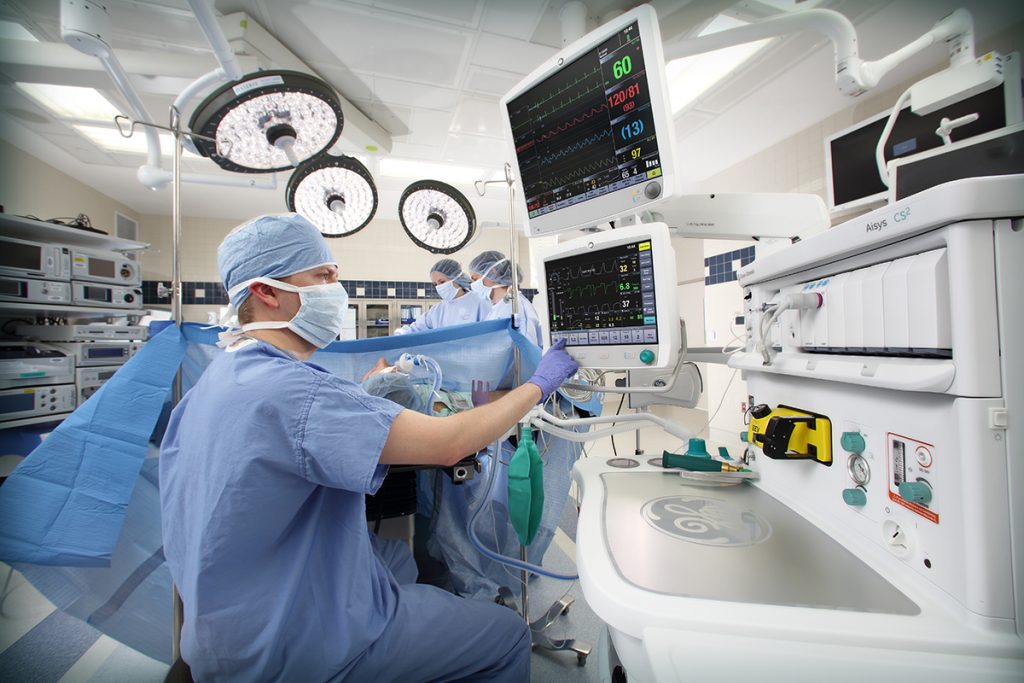April 7, 2020
NEW BREATH
Mechanical ventilators are an important tool for clinicians treating the sickest patients suffering from COVID-19. While manufacturers ramp up production to get more machines into hospitals, doctors are turning to instruments already in their toolboxes. Anesthesia machines, for instance, are a staple of hospital operating rooms. They keep patients asleep during surgery, but they also help them breathe. In alignment with recently issued guidance from the U.S. Food & Drug Administration, GE Healthcare has provided information to customers on the use of anesthesia machines for patients needing mechanical ventilation during the COVID-19 pandemic.
Learning to adapt: GE Healthcare, which has more than 100,000 anesthesia machines currently installed in facilities worldwide, is helping clinicians understand how such machines could be utilized to ventilate patients during the COVID-19 public health emergency. The company has posted information on its website and is producing training videos and educational materials to walk medical professionals through the basic steps — such as removing the vaporizers that would normally deliver anesthetic gas to patients. “It is critical for us to work closely with professional societies, provide easy-to-use education, and deliver clinical innovations to clinicians so they can help patients in every way possible,” said Lisa Nolan, a certified respiratory therapist and global clinical insights and education leader at GE Healthcare.
Learn more here.
INDUSTRY TRANSFORMERS
Millions of Americans have been told by state officials to stay home to help slow the spread of the coronavirus. But that isn’t possible for everyone — for instance, the employees of industrial manufacturers urgently responding to the demands of the day, whether that’s for medical equipment like ventilators or household goods like paper towels. An increasing number of those industries have already been making their operations smarter through automation, a trend that the industry should continue to adopt once the COVID-19 storm passes, according to analyst Craig Resnick. GE Reports sat down with Resnick to learn how those companies are responding to the current crisis, and what their operations might look like in the future.
The next normal: As vice president of consulting for the market research firm ARC Advisory Group, Resnick is watching as companies face the crisis. More home food deliveries, for instance, mean changes for both food manufacturers (which are forgoing distribution centers to ship straight to consumers, in some cases) and pulp and paper manufacturers (which need to churn out more packaging). Shifting demands require manufacturers to be nimble, Resnick said, especially considering that, from now on, change might be the only constant. “‘Normal’ tomorrow is going to be completely different than today,” he continued. “The companies able to react the fastest are the companies that are going to win in the long term.” That also means adopting new digital technologies like automation, artificial intelligence, and virtual and augmented reality.
Learn more here about how companies can smartly weather the crisis.
WAYS THE WORLD ? FOUGHT BACK
1. Saving Face Masks
A team from Duke University reported that a common decontamination technique could extend the lives of the N95 face masks needed by providers treating COVID-19 patients.
2. Promising Antibody Findings
Scientists in China isolated several antibodies that could be “extremely effective” at blocking the coronavirus from entering human cells.
3. On The Rebound
“Taking care of public health first is precisely what generates a stronger economic rebound later,” according to a new study that sought to draw lessons from the past: the 1918-1919 flu pandemic.
Click here for more promising developments in global health.
— QUOTE OF THE DAY —
“Although it can look very dire in the short term, the companies that embrace digital transformation are going to come back stronger than ever.”
— Craig Resnick, vice president of consulting for ARC Advisory Group
Quote: GE Reports. Image: GE Healthcare.
ENJOY THIS NEWSLETTER?
Please send it to your friends and let them know they can subscribe here.






